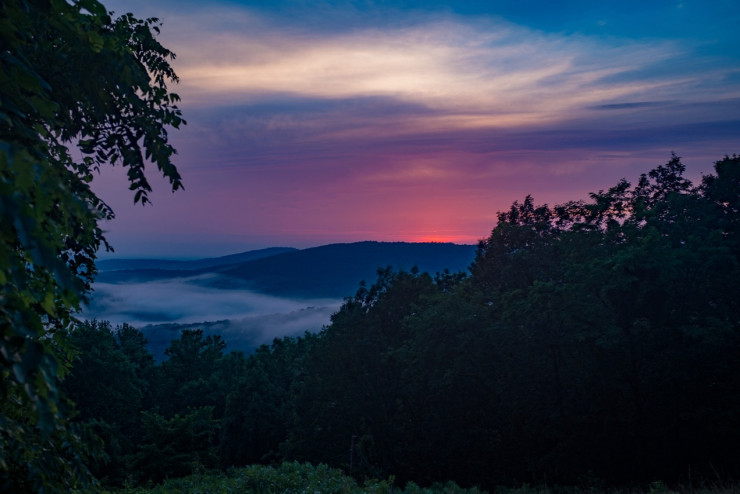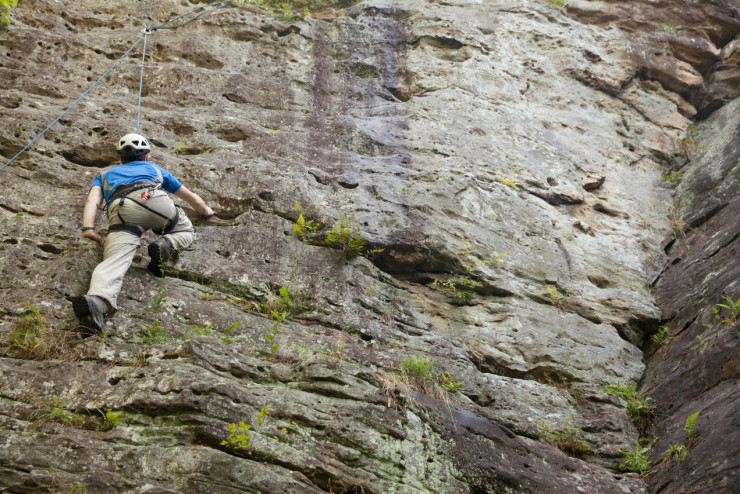
Hiking on the Domain
65 miles of interconnected trails to hike, and one 21-mile loop known as the Perimeter Trail.

We call it the Domain: our Gothic-inspired campus on 13,000 wooded acres, with a 21-mile hiking loop that drops through hollows and runs by waterfalls. As a student you'll be in Sewanee for six weeks—enough time to get to know the place, and enough space to find some clarity. A lot of writers already know our best kept secret. And for you, outside might be where you do your best writing.

65 miles of interconnected trails to hike, and one 21-mile loop known as the Perimeter Trail.

Morgan's Steep? Shakerag? Piney Point? There are so many hikes to choose from.

Ride or walk from Sewanee to Monteagle.

Need maps and directions for hiking and caving? The SOP can help. They might even take us on a canoeing trip.
John Gatta is William B. Kenan Jr. Professor of English at the University of the South. His research and extensive writing—including five books and more than fifty articles—mainly concerns American literature from the seventeenth through the nineteenth centuries, with a special emphasis on the intersections of literature, religion, and the environment. His first book, a critical study of the New England poet Edward Taylor, won the 1989 Academic Book-of-the-Year Award from the Conference on Christianity and Literature, and his second, American Madonna: Images of the Divine Woman in Literary Culture, was named an “outstanding academic book” for 1998 by editors of Choice. His third critical volume, like his second and fifth also from Oxford University Press, is Making Nature Sacred: Literature, Religion, and Environment in America from the Puritans to the Present. A graduate of Notre Dame, with a PhD from Cornell, Gatta has served as Chair of the English Department at the University of Connecticut, where he taught for many years before coming to Sewanee. He is currently Interim Director of the School of Letters, and he has previously served as Dean of the College.
Michael Griffith's books are Trophy, Bibliophilia: A Novella and Stories and Spikes: A Novel; his fiction and nonfiction have appeared in New England Review, Salmagundi, Oxford American, Southwest Review, Five Points, Virginia Quarterly Review, Golf World, and The Washington Post, among other periodicals. He is completing a new nonfiction book called Windfalls in the Bone Orchard. His work has been honored by fellowships from the National Endowment for the Arts, the National Humanities Center, the Taft Foundation, the Louisiana Division of the Arts, and the Sewanee Writers' Conference. Michael Griffith was educated at Princeton and Louisiana State University. Formerly associate editor of the Southern Review, he is now professor of English at the University of Cincinnati and fiction editor of The Cincinnati Review. He is also the editor of Yellow Shoe Fiction, an original-fiction series from LSU Press.
Meera Subramanian is an award-winning independent journalist whose work has been published in national and international publications including the New York Times, NewYorker.com, Nature, Virginia Quarterly Review, and Orion, where she serves as a contributing editor. Her book A River Runs Again: India's Natural World in Crisis, from the Barren Cliffs of Rajasthan to the Farmlands of Karnataka, published by PublicAffairs in 2015, was short-listed for the 2016 Orion Book Award. Through her work, she has explored the disappearance of India’s vultures, questioned the “Good Anthropocene,” sought out fragile shorelines, and investigated perceptions of climate change among conservative Americans. Her essays have been anthologized in Best American Science and Nature Writing, as well as multiple editions of The Best Women’s Travel Writing. She was an MIT Knight Science Journalism Fellow (2016-17) and Fulbright-Nehru Senior Research Fellow (2013-14) and earned an MA in Journalism from New York University. She taught nonfiction at the School of Letters in 2017. Based in Cape Cod, you can find her at www.meerasub.org and @meeratweets.
Winner of a 2018 Guggenheim Fellowship, John Jeremiah Sullivan is a contributing writer to the New York Times Magazine and Southern editor of the Paris Review. Previously he was an editor at Harper's, Oxford American, and GQ Magazine. His prize-winning first book, Blood Horses: Notes of a Sportswriter's Son, was published in 2004. His fiction has appeared in the New Yorker. His journalism and reviews appear regularly in the New York Times, Harper's, Oxford American, GQ, and the Paris Review. Many of these pieces are gathered in his book Pulphead, which has been widely and enthusiastically reviewed. Winner of two National Magazine Awards, the Whiting Writer's Award, and a 2015 Windham-Campbell Literature Prize, Sullivan lives in Wilmington, North Carolina, with his wife and two daughters.
David Haskell’s work integrates scientific, literary, and contemplative studies of the natural world. His latest book, The Songs of Trees: Stories from Nature’s Great Connectors (Viking, 2017), examines the many ways that trees and humans are connected. Deborah Blum, Pulitzer winner, author of The Poisoner’s Handbook, and director of the Knight Science Journalism program at MIT says of The Songs of Trees, “David George Haskell may be the finest literary nature writer working today. The Songs of Trees – compelling, lyrical, wise – is a case in point.” His first book, The Forest Unseen: A Year’s Watch in Nature (Viking, 2012), was winner of the National Academies’ Best Book Award for 2013, finalist for the 2013 Pulitzer Prize in nonfiction, winner of the 2013 Reed Environmental Writing Award, winner of the 2012 National Outdoor Book Award for Natural History Literature, runner-up for the 2013 PEN E. O. Wilson Literary Science Writing Award, and winner, in its Chinese translation, of the 2016 Shenzheng Dapeng Nature Writing Award. Haskell is a 2014-2015 Fellow of the John Simon Guggenheim Memorial Foundation. He holds degrees from the University of Oxford (BA) and from Cornell University (PhD). He is professor of biology and environmental studies at the University of the South and was a guest lecturer at the School of Letters in 2017.